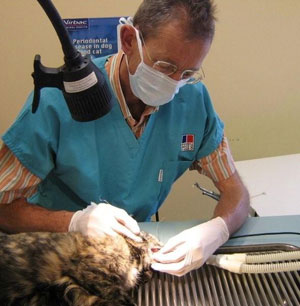Veterinarian
Tasks & duties

Veterinarians working in clinical practice may do some or all of the following:
-
work with the client to prevent and treat animal problems and diseases
-
advise on animal nutrition and the care and welfare of animals
-
examine dead animals to find out the cause of death
-
work closely with herd and flock owners to help them achieve their breeding and production goals
Veterinarians working in other fields may do some or all of the following:
-
set standards for the importation of animals or animal products into New Zealand
-
negotiate with other countries to establish health requirements for animals or animal products exported from New Zealand
-
be involved with disease investigation and research and/or co-ordinate national disease control programmes
-
teach in tertiary institutes
-
research and advise on animal welfare
-
research and advise on animal breeding and production programmes
-
help pharmaceutical companies develop and market products used on animals
Specialisations
Veterinarians often specialise in treating either large or small animals. Some veterinarians may specialise further, for example in treating wildlife, poultry, horses, farm (production), zoo or companion animals.
Skills & knowledge

Veterinarians need to have:
-
knowledge of animals and animal diseases
-
animal-handling skills
-
knowledge of animal anatomy, physiology and biology
-
knowledge of biochemistry, microbiology and parasitology
-
skill in treating animals with medicines and performing surgery
-
knowledge of radiography, dentistry and laboratory methods
-
up-to-date knowledge of recent developments in veterinary science
-
communication skills
-
organisational skills
-
problem-solving and decision making skills
Business management knowledge may also be useful.
Entry requirements
To become a veterinarian you usually have to complete an accredited veterinary science degree at university. Alternatively, you can complete a relevant degree such as science, animal science or veterinary bioscience, followed by a Doctor of Veterinary Medicine.
Secondary education
To get into these courses you usually need to gain your HSC Year 12. Prerequisite subjects, or assumed knowledge, in one or more of English, mathematics, biology, chemistry and physics are normally required. A number of universities in Australia offer degrees in veterinary science. Universities have different prerequisites and some have flexible entry requirements. Contact the universities you are interested in for more information as requirements may change.
Training on the job
Many skills are gained on the job.
Registration
Veterinarians need to be registered with the Veterinary Council of Australia and they must obtain annual practising certificates.
Useful experience
Practical experience with farm animals such as work on a dairy, sheep or cattle farm, or work with domestic animals is an advantage. Other useful experience includes work as an animal technician in a research laboratory, animal training or any other work relating to the care of animals. Experience with other animal owners is also helpful.
Video
from WA career Centre on you tube
Related courses
Animal Husbandry
Veterinary Science
For more information, please refer to myfuture.
Document Actions
